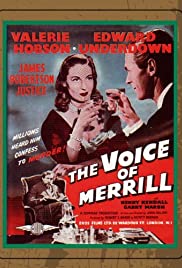
THE VOICE OF MERRILL
UK, 1952, 84 minutes, Black and white.
Valerie Hobson, Edward Underdown, James Robertson Justice, Henry Kendall, Gary Marsh.
Directed by John Gilling.
This is a brief, entertaining murder mystery from Britain in the early 1950s. Valerie Hobson had been in films since the 1930s and was soon to bring her career to a close to look after her children (and later deal with the scandal concerning her husband, John Profumo). Edward Underdown was getting leading roles but continued in television for the succeeding decades. James Robertson Justice portrays, is almost always, a hugely gruff and cranky man (and it is not surprising to hear that in real life he didn’t I from a stroke). Henry Kendall is a publisher.
The film focuses on the BBC, opening with BBC house and then showing a man’s feet walking towards the building and then murdering a young woman. The three men suspects, Edward Underdown as Hugh, a writer, having a date with the murdered woman; Parker the publisher being blackmailed about investment by the young woman; Jonathan, James Robertson Justice, despising her lack of intelligence as he despised practically everyone else.
While the police investigate, a situation arises where Hugh is asked to read stories on the BBC actually written by Jonathan, honestly. They are very popular but Jonathan realises that Hugh and his wife are attracted and, so, he writes the final story is a kind of confession about the murder of the young woman, the police interpreting it as Hugh being the killer.
There are complications with Parker not telling the truth, with Jonathan death and blame for his wife – and some retribution for her, and the moral codes of the time for films, in her being involved in a car accident even as Hugh is exonerated.
Writing and direction is by John Gilling who made a number of short features in the 1950s and into the 60s but moved then into quite a number of horror thrillers.
1. A small British film? Strong cast? Murder mystery? And the focus on the BBC?
2. London settings, offices, flats and homes, radio studios? The musical score?
3. The murder mystery, the three suspects, the victim? The opening, BBC house, the ordinary street, following the footsteps, the murder? The revelation that the woman was employed by Parker, was on a date with Hugh, was known by Roach? Her blackmailing Parker? Roach and his dismissing her intelligence?
4. At the restaurant, Hugh waiting for his date, noticing Alycia, the gradual glances, her gradual smile? Parker arriving, inviting Hugh to the table? The phone call about the death?
5. Alycia, her being married to Jonathan, the credibility of the marriage? Her roving eye with Hugh? The scenes at home, the tension with her husband?
6. Jonathan, the James Robertson Justice personality, gruff, unwell, his medication, the doctor? His condemnation of everyone? Inspector Thornton, going to the theatre, the rehearsal of his play, his barbed criticism of the actors? His condemnation of the dead woman? At home, with Alycia, taking his medicine? The short stories, Alycia encouraging him to broadcast them? The arrangement with the BBC? Parker as publisher? His writing the stories? The meeting with Hugh, suspicions about him? Agreeing that Hugh should read the stories? The anonymous title, Alycia’s maiden name?
7. The success of the stories, Hugh and his success, audience assuming that he wrote the stories? Celebrity, letters, the BBC, autographs? The photo in the street, in the paper?
8. With Alycia, the dinner, the drive, the visitor’s office, reading the script? Praising it to Jonathan? Her encouragement of Hugh reading the broadcasts? Her encouraging him to take the credit for the writing? Her love, plans for the future? His success as a writer?
9. Jonathan, knowing what was happening, the issue of the drops and his wife, the attack, his dying of natural causes? Alycia, worried about being arrested? Hugh and his phone call, wanting to confess and save her? Her hurrying to the meeting?
10. Parker, Jonathan’s letter, not to reveal the truth about the authorship of the Merrill stories? Parker refusing to support Hugh?
11. The police listening, the story as something of a confession – the assumption that it was Hugh? Parker not supporting him because of the loan and his appeal to Jonathan?
12. Alycia, hurrying, calling out, the accident in the street – and so her being punished? And the revelation of the truth?